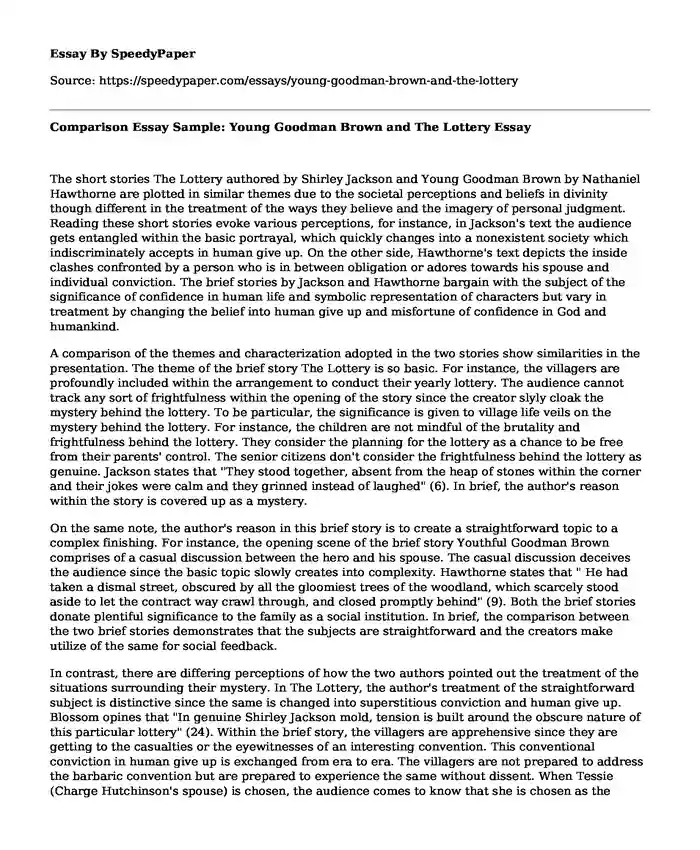
| Type of paper: | Essay |
| Categories: | Shirley Jackson Nathaniel Hawthorne The Lottery |
| Pages: | 3 |
| Wordcount: | 676 words |
The short stories The Lottery authored by Shirley Jackson and Young Goodman Brown by Nathaniel Hawthorne are plotted in similar themes due to the societal perceptions and beliefs in divinity though different in the treatment of the ways they believe and the imagery of personal judgment. Reading these short stories evoke various perceptions, for instance, in Jackson's text the audience gets entangled within the basic portrayal, which quickly changes into a nonexistent society which indiscriminately accepts in human give up. On the other side, Hawthorne's text depicts the inside clashes confronted by a person who is in between obligation or adores towards his spouse and individual conviction. The brief stories by Jackson and Hawthorne bargain with the subject of the significance of confidence in human life and symbolic representation of characters but vary in treatment by changing the belief into human give up and misfortune of confidence in God and humankind.
A comparison of the themes and characterization adopted in the two stories show similarities in the presentation. The theme of the brief story The Lottery is so basic. For instance, the villagers are profoundly included within the arrangement to conduct their yearly lottery. The audience cannot track any sort of frightfulness within the opening of the story since the creator slyly cloak the mystery behind the lottery. To be particular, the significance is given to village life veils on the mystery behind the lottery. For instance, the children are not mindful of the brutality and frightfulness behind the lottery. They consider the planning for the lottery as a chance to be free from their parents' control. The senior citizens don't consider the frightfulness behind the lottery as genuine. Jackson states that "They stood together, absent from the heap of stones within the corner and their jokes were calm and they grinned instead of laughed" (6). In brief, the author's reason within the story is covered up as a mystery.
On the same note, the author's reason in this brief story is to create a straightforward topic to a complex finishing. For instance, the opening scene of the brief story Youthful Goodman Brown comprises of a casual discussion between the hero and his spouse. The casual discussion deceives the audience since the basic topic slowly creates into complexity. Hawthorne states that " He had taken a dismal street, obscured by all the gloomiest trees of the woodland, which scarcely stood aside to let the contract way crawl through, and closed promptly behind" (9). Both the brief stories donate plentiful significance to the family as a social institution. In brief, the comparison between the two brief stories demonstrates that the subjects are straightforward and the creators make utilize of the same for social feedback.
In contrast, there are differing perceptions of how the two authors pointed out the treatment of the situations surrounding their mystery. In The Lottery, the author's treatment of the straightforward subject is distinctive since the same is changed into superstitious conviction and human give up. Blossom opines that "In genuine Shirley Jackson mold, tension is built around the obscure nature of this particular lottery" (24). Within the brief story, the villagers are apprehensive since they are getting to the casualties or the eyewitnesses of an interesting convention. This conventional conviction in human give up is exchanged from era to era. The villagers are not prepared to address the barbaric convention but are prepared to experience the same without dissent. When Tessie (Charge Hutchinson's spouse) is chosen, the audience comes to know that she is chosen as the casualty of a cruel convention taken after by the villagers. Inside this setting, the term lottery cannot be associated with luckiness but passing.
In conclusion, the two short stories depict contrasting treatment of the conviction of similar context in the belief of religion as well as societal norms. The main characterization in the stories gives significant relevance to the plot development in the fate of the individuals.
Work cited
Jackson, Shirley "The Lottery". The New Yorker, (26 June 1948).
Hawthorne, Nathaniel "Summary of Young Goodman Brown", articlemyriad.com; accessed April 7th, 2019.
Cite this page
Comparison Essay Sample: Young Goodman Brown and The Lottery. (2022, Feb 18). Retrieved from https://speedypaper.net/essays/young-goodman-brown-and-the-lottery
Request Removal
If you are the original author of this essay and no longer wish to have it published on the SpeedyPaper website, please click below to request its removal:
- America's Transition into a Super Power - Free Essay in American History
- Free Essay Answering Who Was Nat Turner and Why He Was Significant in History
- Free Essay Example: Career Goals and Strategy
- Free Essay Comprising a Business Management Article Review
- Essay Example: My Experience at the Houston Food Bank
- Free Essay: The Gamma Hydroxybutyrate (GHB) Drug and Its Reaction With Alcohol
- Free Essay - Leadership Change Analysis
Popular categories




